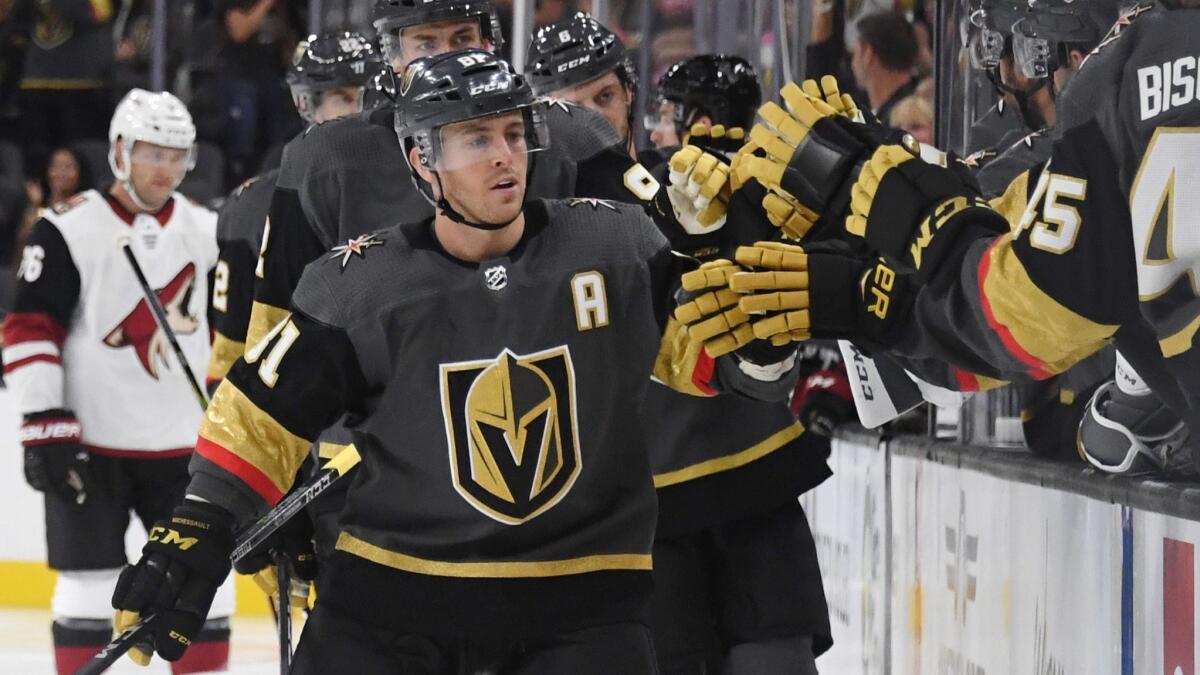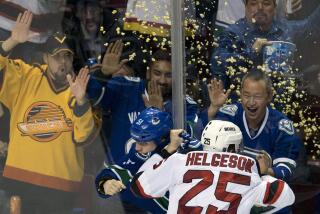Column: Speed and scoring is increasing in the NHL, but it could all come to a grinding halt in 2020

- Share via
First, the good news.
Emphasizing speed and youth is a growing and welcome trend in the NHL, which was inching in that direction before the success of the Vegas Golden Knights accelerated the process.
The expansion Golden Knights reached the Stanley Cup Final on the strength of their speed, their ability to operate at a fast tempo, and the depth that allowed them to roll four lines. This being a copycat league, many teams will try to replicate that by establishing a brisk pace and asking swift-skating kids to lead them.
There will be moments of pure skill and brilliance and moments when that speed produces cringe-worthy defensive mistakes, but this philosophical shift should be entertaining and hasten the emergence of the next generation of stars.
The shift to speed and away from brawn helps smaller, skilled players to thrive. Among them: Chicago’s Alex DeBrincat stands 5 feet 7 and 165 pounds but scored a big 28 goals and 52 points for the Blackhawks last season. Johnny Gaudreau, listed on the Calgary Flames’ roster as 5-9 and 157 pounds, collected 24 goals and a career-best 84 points last season. Torey Krug of Boston is 5-9, especially short for a defenseman, but he has proven to be a good power-play quarterback. Vegas center Jonathan Marchessault, also listed at 5-9, scored 27 goals and a career-high 75 points last season. And so on, in happy continuation.
The average number of goals per game last season was 5.94, the highest since teams combined to average 6.16 goals per game in 2005-06. Cracking down on slashing the hands and a rise in power plays contributed to that. Three players reached or topped 100 points last season, the most since four scored 100 or more in 2009-10.
And now for the not-so-good news.
The second-biggest topic of conversation this season, behind the hurry-up pace, will be the relationship between the NHL and the NHL Players’ Assn. as they approach the date when either side can opt out of their collective bargaining agreement.
The NHL can opt out by Sept. 1, 2019 and the NHLPA can opt out by Sept. 19, 2019. This labor deal will end on Sept. 15, 2020 if either side exercises its option. If both sides want to keep it, the agreement would expire in 2022.
A lockout is a solid bet, given the history of acrimony between Commissioner Gary Bettman and the players’ association. Many players have structured their contracts to minimize their losses if Bettman goes for the Grand Slam after locking players out for parts of the 1994-95 and 2012-13 seasons and cancelling the entire 2004-05 season.
The highest annual salary in the seven-year, $77-million contract John Tavares signed with Toronto is $910,000 — but he’s due $70,890,000 in signing bonuses, which are payable even if the league locks players out. NHL scoring champion Connor McDavid’s $100-million contract kicks in this season and includes $86 million in signing bonuses.
The thorniest issue is the players’ unhappiness with the NHL’s escrow system, which withholds money from players’ paychecks at the start of the season to ensure there’s a 50-50 split of hockey-related revenues between players and owners. The initial amount withheld is based on projected revenues; if final revenue calculations find players got less than 50%, they’ll get back a portion of what they’ve paid. The amount withheld has been upward of 15%.
Another likely talking point is whether the NHL will allow players to represent their homelands in the 2022 Winter Olympics in China after skipping the 2018 Pyeongchang Games. Players want to go and the NHL has long eyed China as a potentially lucrative market; Bettman is likely to use Olympic participation as a bargaining chip to get something he and owners want.
In the meantime, there’s a lot to enjoy while the doors are open and the lights are on.
After a rare season in which there were no coaching changes, six jobs were shuffled over the summer. The most prominent move was Cup-winning coach Barry Trotz leaving the Washington Capitals for the New York Islanders following a dispute over his post-championship salary. He was replaced by his former assistant, Todd Reirden. Former Carolina coach Bill Peters landed in Calgary, which last season couldn’t overcome a succession of injuries to key players. Carolina replaced him with Rod Brind’Amour, who has no NHL coaching experience. University of Denver coach Jim Montgomery made the jump to the NHL to Dallas, which has missed the playoffs the last two seasons, and former Boston University coach David Quinn will make his NHL coaching debut with the New York Rangers, who also missed the playoffs last season.
The 2018-19 season will open on Wednesday, when the Capitals raise their Cup banner. We don’t know where the season it will end, but the journey promises to be a fun ride.
Follow Helene Elliott on Twitter @helenenothelen
More to Read
Go beyond the scoreboard
Get the latest on L.A.'s teams in the daily Sports Report newsletter.
You may occasionally receive promotional content from the Los Angeles Times.






